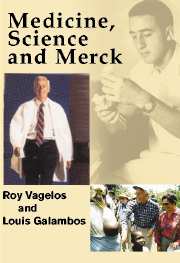Book contents
- Frontmatter
- Contents
- Preface
- 1 The Making of a Physician
- 2 Hot Science in Big Government
- 3 The French Alternative
- 4 The Research University – American Style
- 5 Turning the Corner at Merck
- 6 Crisis
- 7 Blockbusters
- 8 On-the-Job Training
- 9 Global Aspirations
- 10 The Moral Corporation
- 11 Getting to Know the Clintons
- 12 Partners
- Index
11 - Getting to Know the Clintons
Published online by Cambridge University Press: 30 July 2009
- Frontmatter
- Contents
- Preface
- 1 The Making of a Physician
- 2 Hot Science in Big Government
- 3 The French Alternative
- 4 The Research University – American Style
- 5 Turning the Corner at Merck
- 6 Crisis
- 7 Blockbusters
- 8 On-the-Job Training
- 9 Global Aspirations
- 10 The Moral Corporation
- 11 Getting to Know the Clintons
- 12 Partners
- Index
Summary
In September 1992, Bill Clinton's presidential campaign organization asked if their candidate could deliver a major address at Merck's company headquarters in Rahway, New Jersey. Merck had never before hosted a presidential candidate there, and after some probing, we learned that Clinton's team had targeted Merck for the candidate's first important speech on healthcare reform.
Why Merck? I thought they'd chosen our company in part because of its reputation within the pharmaceutical industry. Although I hadn't been active in Democratic politics, I was a significant financial supporter of Bill Bradley and Frank Lautenberg, two Democrat senators from New Jersey. The other and more important reasons, I decided, were some of our company's recent activities. During the previous year, Merck had introduced its new policy on pricing, keying increases to changes in the Consumer Price Index. That innovation had received a great deal of favorable press as had our earlier decision to donate Mectizan to any program in the world capable of distributing the drug to people endangered by river blindness.
Merck was riding high, enjoying the kind of public acclaim for which every business and every CEO yearns. America's most admired corporation was an ideal platform for a major address on healthcare. Rather than announce their new proposals in a public health forum, we thought the Clinton team might want to use a corporate setting to suggest that their program had broad support, from business to organized labor, from conservatives to liberals.
- Type
- Chapter
- Information
- Medicine, Science and Merck , pp. 257 - 271Publisher: Cambridge University PressPrint publication year: 2004



